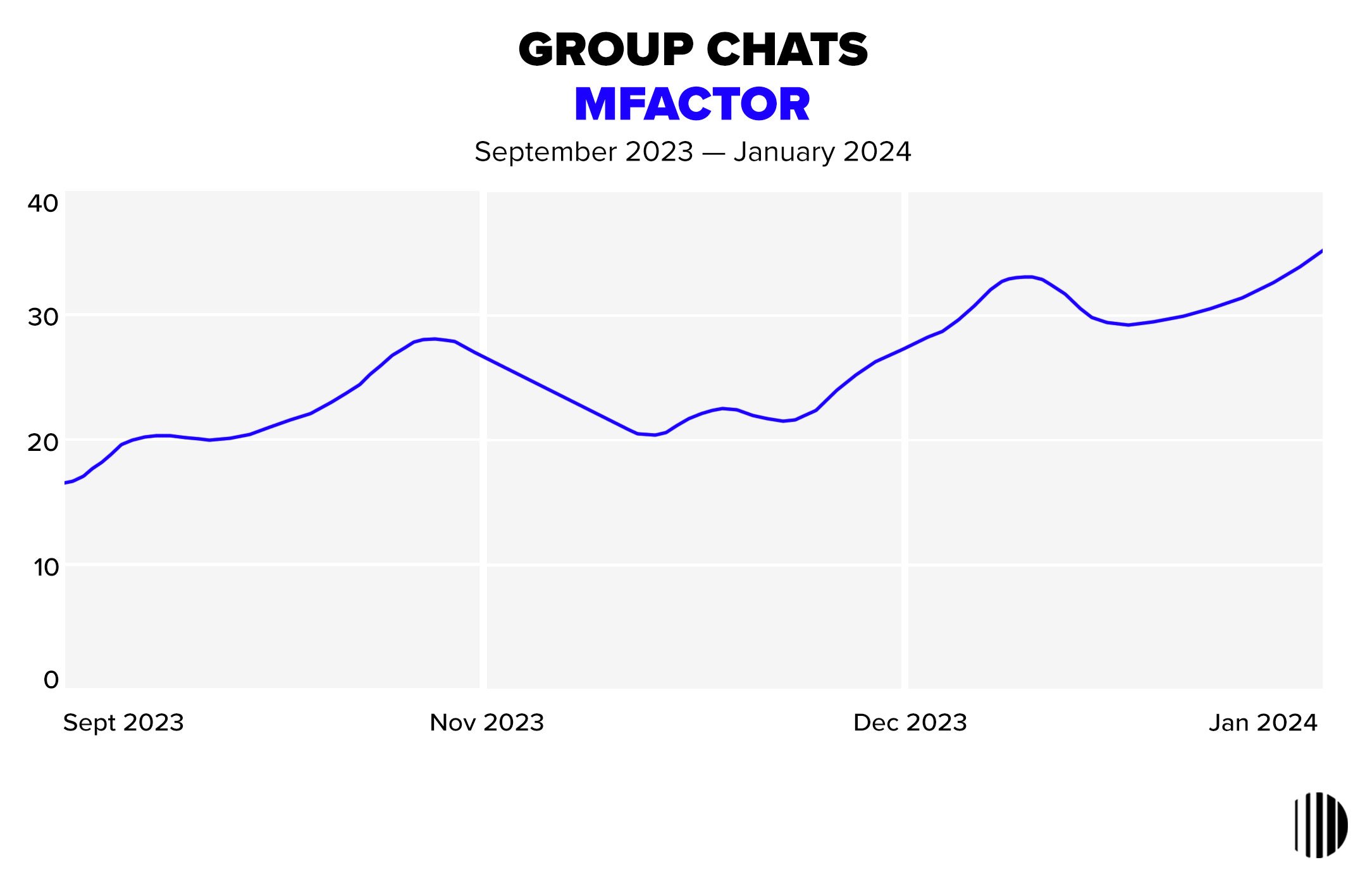Are you in or are you out?
Welcome to the Gated Community Era of digital connections. We are calling them Closed Communities.
Closed communities are private communication channels -- everything from your group chat on messenger to a group insta DM to a closed Facebook group to Discord, where users can interact with one another, connecting on the basis of shared interests on secure platforms.
Think virtual groups with a gatekeeper to make sure the right people are in and keep the group on track.
Gen-Zalpha and their Millennial Elders are turning to private channels of communication to connect with each other, with culture and increasingly with their brands. This isn’t to say they’re ditching social media completely-- they’re just finding their new niche.
Steering clear of the…
ad-congested
political sphere
privacy threatening
…algorithms that have become the social media norm.
The Net-Net:
The momentum of “group chats” has doubled since 2023
New platforms are emerging to facilitate two-way conversations between consumers and brands
There are new rules on how brands should engage for creating their own closed communities vs. respectfully entering existing ones
⬇️ What’s Down:
Social media platforms as a place for meaningful engagement.
Where your social feed used to dictate what’s cool, what’s hot, and what you should be into, the new gen of users already know what they like. They don’t want social feeds deluged with branded content and influencers pushing the next “thing.”
They’re over one-way, brand-led conversations. Gen-Z doesn’t want to just listen, they want to be active participants in the conversation.
There’s no end in sight with this momentum – Instagram found that Gen Alpha (teens) are spending more time in DMs than they do in stories or on their feeds.
The data proves it: “Group Chat” doubled in momentum from last year increasing from 18.5 to 36.9.
⬆️ What’s Up:
Closed Communities are on the rise (29 Velocity).They offer private channels of discourse where users can engage in conversation that is meaningful to them. It’s an intimate forum that participants opt to be a part of and a place where brands don’t lead the conversation, users do.
What you need to know about Closed Communities:
Realizing even their most obscure interests don’t exist in isolation, consumers use closed communities to further connect in safe spaces of common ground.
The nature of the community being closed lends itself to heightened participation.
Given that these communities are closed (private), participants have a more autonomous space to converse, without the pressure of the entire internet’s scrutiny.
They know the other people in the group geek out over the same things they do, and there’s an ethos that governs these groups that conversations that happen there, stay there.
Here are the platforms to pay attention to that are enabling new school “group chats”:
TYB: an “earn-to-play” platform that empowers brands to cultivate meaningful connections with their customers, offering not just a platform for community building, but an owned retention channel that measures the impact of community on commerce.
Geneva: a group chat app that prioritizes discovery, connections, and has even replaced some company Slack accounts
Snapchat: we’re betting on greater momentum for the photo sharing app co-opted by Gen-Zalpha for messaging. Snapchat private stories is what the next gen uses to create their own closed off social channels. There’s more to be done to connecting their users with their “real-life social circle”
TikTok is on to it too: we’ve 👀 how the comments are being grouped by what people are talking about to create shared discussions. Next step - moving it elsewhere and out of the public domain.
➡️ What’s Next:
So, what does this mean for brands? It’s not that social advertising as we know it is done, but it’s time to think of the more meaningful place where conversation is happening -- the private channels.
Brands are beginning to experiment with it:
Creating their own closed communities: Rare Beauty is a pioneer in the field of leveraging closed communities. They started hosting Zoom chats with fans of founder Selena Gomez, and adding participants into an IG group chat. They eventually took the growing group over to the app Geneva before finally settling on the “earn-to-play” platform, TYB.
PRO TIP: To build a community, brands will have to put in a little more work in order to sustain the momentum of the closed group. Be clear on the purpose and why users should engage and be comfortable being reactive – listen for what fans are fans of and build real communities around that. You can start small – try creating a Slack channel just for fans!
Respectfully infiltrating: Think of this as a new era of brand ambassadors: brand “listeners.” Brands are paying community managers on platforms like Discord to be brand representatives – active participants there to listen and learn and get feedback on how to better connect, innovate and drive momentum.
PRO TIP: If joining a pre-existing group, it’s key to make yourself known, be transparent about why you are there and what you are up to. Actively participate to listen and learn.
If you’ve made it this far, we leave you with a new term to sum up this trend & drop in your next convo: The Cozy Web (Velocity 7).
Many experts are comparing this kind of privatized online behavior to that of 2001 when Facebook Groups, AIM chatrooms, and fan message boards were all the rage.
In the 2024 version, the Cozy Web is made up of all the private spaces online people have retreated to over the years, where advertisers can’t spend their way into people’s attention. It is relaxed, community-oriented, and pretty fetch (welcome back Mean Girls), tbh.




